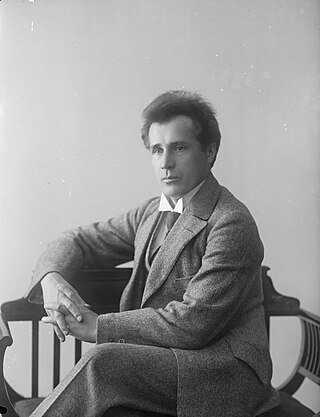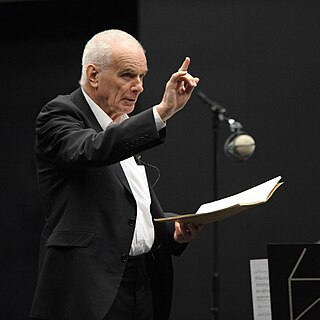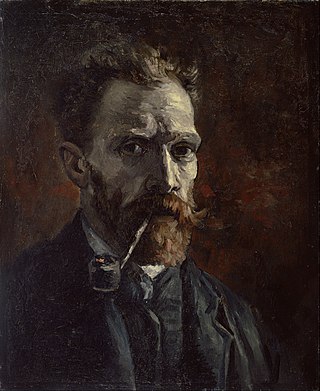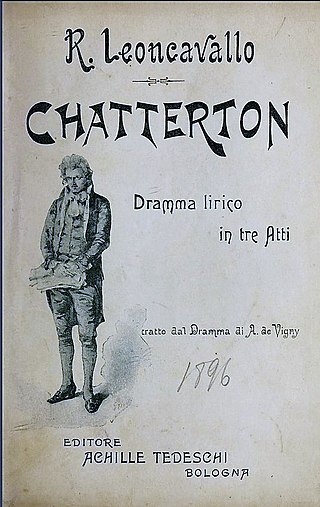Related Research Articles

Opera is a form of theatre in which music is a fundamental component and dramatic roles are taken by singers. Such a "work" is typically a collaboration between a composer and a librettist and incorporates a number of the performing arts, such as acting, scenery, costume, and sometimes dance or ballet. The performance is typically given in an opera house, accompanied by an orchestra or smaller musical ensemble, which since the early 19th century has been led by a conductor. Although musical theatre is closely related to opera, the two are considered to be distinct from one another.
The music of Finland can be roughly divided into folk music, classical and contemporary art music, and contemporary popular music.

Einojuhani Rautavaara was a Finnish composer of classical music. Among the most notable Finnish composers since Jean Sibelius (1865–1957), Rautavaara wrote a great number of works spanning various styles. These include eight symphonies, nine operas and fifteen concertos, as well as numerous vocal and chamber works. Having written early works using 12-tone serial techniques, his later music may be described as neo-romantic and mystical. His major works include his first piano concerto (1969), Cantus Arcticus (1972) and his seventh symphony, Angel of Light (1994).

Leevi Antti Madetoja was a Finnish composer, music critic, conductor, and teacher of the late-Romantic and early-modern periods. He is widely recognized as one of the most significant Finnish contemporaries of Jean Sibelius, under whom he studied privately from 1908 to 1910.
Thomas may refer to:

Leif Selim Segerstam is a Finnish conductor, composer, violinist, violist and pianist, especially known for writing 371 symphonies, along with other works in his extensive oeuvre.

Savonlinna Opera Festival is held annually in the city of Savonlinna in Finland. The Festival takes place at the medieval Olavinlinna, built in 1475. The castle is located amid spectacular lake scenery.
Opera is an art form in which singers and musicians perform a dramatic work, which combines a text and a musical score. Opera is part of the Western classical music tradition. While the scale of opera can be larger or smaller—there are many different genres of opera—performance typically involves different types of artist and technical staff. Usually an orchestra led by a conductor accompanies the singers. In contrast to spoken theatre, the opera world is international. Italian, German, French, English, and Russian works are performed worldwide in their original languages, and artists travel from country to country performing.

The Building of the Boat was a projected Wagnerian opera for soloists, choir, and orchestra that occupied the Finnish composer Jean Sibelius from 8 July 1893 to late-August 1894, at which point he abandoned the project. The piece was to have been a collaboration with the Finnish author J. H. Erkko, whose libretto adapted Runos VIII and XVI of the Kalevala, Finland's national epic. In the story, the wizard Väinämöinen tries to seduce the moon goddess Kuutar by building a boat with magic; his incantation is missing three words, and he journeys to the underworld of Tuonela to obtain them. In July 1894, Sibelius attended Wagner festivals in Bayreuth and Munich. His enthusiasm for his own opera project waned as his attitude towards the German master turned ambivalent and, then, decisively hostile. Instead, Sibelius began to identify as a "tone painter" in the Lisztian mold.

Taverner is an opera with music and libretto by Peter Maxwell Davies. It is based on the life of the 16th-century English composer John Taverner, but in what Davies himself acknowledged was a non-realistic treatment. The gestation for the opera dated as far back as 1956 during Davies's years in Manchester, and continued when he went to Princeton University in 1962. Davies produced several instrumental works related to the opera during this gestation period, including the Points and Dances from 'Taverner' and the Second Fantasia on John Taverner's "In Nomine". Davies had completed the opera in 1968, but lost parts of the score in a fire at his Dorset cottage in 1969, which necessitated recomposition. Davies completed the opera in 1970.
Aleksis Kivi (1995–96) is an opera in two acts by Einojuhani Rautavaara, to a libretto by the composer. It was first performed by the Savonlinna Opera Festival on 8 July 1997, with Jorma Hynninen in the title role. The opera deals with episodes in the life of Aleksis Kivi, the Finnish national writer. The opera was written at the request of Hynninen.

The Maiden in the Tower, JS 101, is an opera in one act—comprising an overture and eight scenes—written in 1896 by the Finnish composer Jean Sibelius. The piece was a collaboration with the Finnish author Rafael Hertzberg, the Swedish-language libretto of whom tells a "simple tale of chivalry" that may nonetheless have had allegorical ambitions: the Bailiff abducts and imprisons the Maiden ; although she endures hardship, she remains true to herself and is freed subsequently by her Lover and the Chatelaine of the castle.

Vincent is an opera in three acts by Einojuhani Rautavaara first performed in 1990. The libretto is by the composer, and consists of scenes from the life of the artist Vincent van Gogh, told in retrospect.

Chatterton is a dramma lirico or opera in three acts by Ruggero Leoncavallo. The libretto was written by the composer himself and is freely adapted from the life of the young English poet from Bristol, Thomas Chatterton (1752–1770). Although composed in 1876, it premiered 20 years later on 10 March 1896, at the Teatro Drammatico Nazionale in Rome.
Prinsessan av Cypern is a four-act fairy opera by Fredrik Pacius, with a Swedish libretto by Zacharias Topelius. It is sometimes referred to as a singspiel or simply as incidental music to the play.
The masque Comus, or There in the Blissful Shades is a short version of John Milton's Comus, based on a libretto earlier made by John Dalton for composer Thomas Arne's own Comus. The sixty-year-old Handel composed the setting in 1745 for the pleasure of other guests during his summer recuperation at the country seat of the Earl of Gainsborough. Some of the music was later recycled by Handel, for example as the tenor aria Then will I Jehovah's praise from the Occasional Oratorio.

A Requiem in Our Time, Op. 3, is a composition for brass ensemble and percussion by Einojuhani Rautavaara, written in 1953. It won him international attention while still a student.

Rasputin is a 2003 Finnish-language opera in three acts by Einojuhani Rautavaara.
Tietäjien lahja is a 1994 Christmas chamber opera by Einojuhani Rautavaara. The libretto is based on The Gift of the Magi by American author O. Henry which Rautavaara had first encountered in New York in 1955. However the story was changed from 1900 New York to the composer's own childhood in Helsinki's Kallio district in the 1930s.
Auringon talo is a 1990 Finnish-language chamber opera by Einojuhani Rautavaara.
References
- ↑ Matthew Boyden; Nick Kimberley (2002). "Thomas". In Joe Staines (ed.). The Rough Guide to Opera. Rough Guides. p. 582. ISBN 9781858287492.
Libretto by the composer. Synopsis Act I: Finland, the thirteenth century. At the end of his life, Thomas, formerly bishop of Finland and an early proponent of the idea of Finnish nationhood, sees his past flash before him. He remembers children ..."
- ↑ Sini Rautavaara was the composer's spouse.